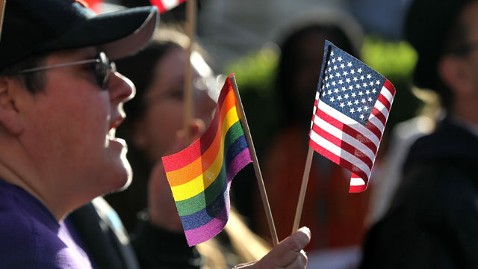Gay Marriage Advocates Hope for Sweeping Supreme Court Ruling, Right? Wrong!

Justin Sullivan/Getty Images
Hours after winning a landmark case in a California federal appeals court that struck down the state's ban on gay marriage, lawyer Theodore B. Olson, who had filed a lawsuit against the ban known as Proposition 8, talked about the odds of the Supreme Court taking up the case.
"This issue will go to the Supreme Court, I think it will go to the Supreme Court in this case, " he told MSNBC's Rachel Maddow.
But because the decision by the U.S. Court of Appeals for the 9th Circuit was so specific to California's unique history with same-sex marriage, some legal analysts believe the justices might pass on the case. Or if the court took it up, it would rule narrowly on Proposition 8 -saving the broader question of whether gays and lesbians have a right to marry for another day.
And that would be just fine for some advocates of gay marriage.
"If by some chance the Supreme Court decided today that same-sex couples had a right to marry, I could see an enormous outcry and a push for a federal constitutional amendment that would ban it. Even if it lost, that would be a nightmare." E. J. Graff writes in The American Prospect.
Before the challenge to Prop 8 was brought to federal court by the American Foundation for Equal Rights and its lead lawyers, Olson and David Boies, other longtime same-sex marriage litigators focused more on challenging laws that prohibit gay marriage at the state level.
"When Olson and Boies brought this, there was a fear by some members of the gay rights community that you could get an adverse ruling in federal court that would slow political momentum and shut legal doors, " says Jane Schacter, a professor at Stanford Law School.
The preferred strategy was to go state by state, picking the states very carefully and working to legalize gay marriage at the state level.
"The Supreme Court rarely gets out that far in front of public opinion, and the court is wary of rulings that are likely to provoke a lot of backlash and opposition," says Schacter. "The strategy by some advocates is to get more and more states to legalize gay marriage, and then go to the Supreme Court."
While advocates were happy with the federal appeals court ruling, they are not all pressing for a sweeping ruling from the Supreme Court on the issue.
Currently, only six states and the District of Columbia allow same-sex marriages, while other states are moving in that direction.
"The outlook is very positive. The citizens of Maine may get an opportunity to return to the ballot on marriage. The legislature in Washington appears poised to enact marriage equality. The legislature in New Jersey is now considering a marriage equality bill. A marriage equality bill has just been introduced in Illinois where the legislature recently enacted civil unions, " says Tobias Barrington Wolff, a professor at the University of Pennsylvania Law School who also advised the Obama campaign on lesbian, gay, bisexual and transgender issues during the 2008 campaign.
It's a carefully crafted Supreme Court strategy by advocates hoping to build momentum on the issue.
"Every successful civil rights movement has involved careful choices over time about what cases are likely to move the law in a positive direction, and which cases are likely to produce good outcomes. That was true of the civil rights movement for African-Americans, it was true for the women's rights movement and it has been true of the LGBT movement, " says Wolff.
He says there are tactical decisions made because the Supreme Court does not like to speak on an issue prematurely.
"It is helpful to the justices to benefit from the work of other judges in other courts exploring and analyzing an issue over time before they weigh in with a ruling that can define or change the law for everybody."
The challenge to Prop 8 is not the only high-profile gay rights case playing out in federal court. Challenges to the Defense of Marriage Act, or DOMA, which does not recognize gay marriage, have also been brought to the lower courts. Those cases do not present the question of whether gay couples have the right to marry, because the plaintiffs are married in states that allow gay marriage. Instead, the cases challenge DOMA, which denies federal recognition of same-sex marriage.